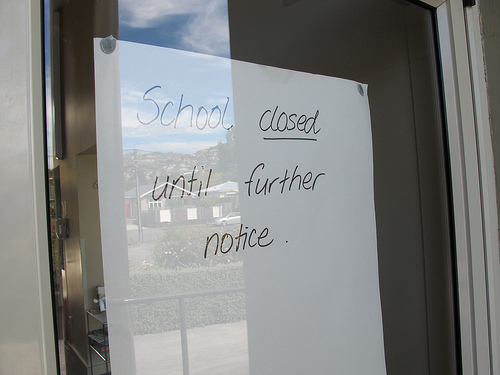Corey Quinn has decided the best option for his Catholic middle school is to become a public charter school—but it is not a decision he likes.
“We have precious few options, and in terms of school reform and school choice this is it, and that is why we are opting for becoming a charter school,” said Quinn, executive director of De La Salle Middle School in St. Louis.
Private schools have increasingly felt financial pressure in recent years as tax-supported charter schools increase in market share. That pressure has weighed particularly on Catholic and other faith-based schools in urban areas. In the past year, 148 Catholic schools have closed.
Shifting Mission
De La Salle, founded by the Christian Brothers, was a part of the NativityMiguel network of 65 faith-based private schools—mostly Catholic—serving poor, urban communities. A year and a half ago the network folded because of its increasing number of financially struggling schools, and De La Salle directors began considering how to sustain their system, which is sustained primarily through fundraising rather than asking poor families to pay much tuition.
Quinn said the organization found a potential solution after visiting Christian Brothers schools in Chicago called Catalyst Schools, which are charter schools that serve thousands of students.
“We were pretty blown away by the feel of the charter school,” he said. “It felt very familiar to what we knew and experienced in our way of doing things. The scale was very foreign, though, because there were so many kids being served by this mission.”
Losing Education Diversity
Struggling private schools have few options, and converting to charter schools is becoming more prevalent, although it is not easy.
Quinn said the directors of De La Salle have tried to think creatively about their tough situation. Converting a faith-based school into a charter school is neither easy nor popular, he said.
More private schools are shutting down than converting into charter schools, partly because of the difficulty of the conversion process, said Peter Hanley, executive director of the American Center for School Choice.
“In some states, like California, it is actually against the law for a private school to become a charter school. And for practical reasons it is not that easy, either. It is not easy to convert your curriculum into a state-standard curriculum,” Hanley said.
Opposition from Faith Community
Hanley also said converting a faith-based school faces firm opposition from constituents.
“There are a lot of people in the faith community that say, ‘You know that’s not what we do. It is no longer a faith-based school. We are not going to pretend that it still is and put a different label on it,’ ” Hanley said.
Quinn said he has felt that pushback. Since De La Salle announced its intentions to convert to a charter school, he has received emails criticizing its willingness to “get in bed with the government” and “tear down the crosses.”
A 2012 meta-analysis of 90 studies comparing religious schools to public and charter schools found students in religious schools learn several months more than their counterparts, even when controlling for factors like race and income.
Quinn said it is important to remember his school’s mission.
“When … we see what is out there for the kids that we are here to serve, we say to ourselves, ‘De La Salle struggling and perhaps someday dying due to a strict allegiance to our creed does not serve children well,'” Quinn said.
Looking to Policy
To preserve a future for private schools, lawmakers must “level the playing field” between private schools and government-subsidized options, said both Hanley and Jeff Reed, a spokesman for the Friedman Foundation for Educational Choice.
“Private schools have to compete with a ‘free-product’—that is, public schools, but of course [public schools] are not free at all,” Reed said. “We all pay for them through taxes. We must put the customers of education back in charge.”
Reed says a fair education marketplace requires both a high-quality charter school law and also a private school choice program.
In addition to creating private school choice laws in each state, clarifying charter school laws would also help, Hanley said.
“The Supreme Court has said that under the U.S. Constitution, if you are providing the aid and if the parents are making the choice [using public funds for faith-based education] is allowed,” he said. “It seems as if you could have a charter school as a faith-based school if it is the parents that make the choice. But that is not where we are right now,” Hanley said.
Losing Valuable Schools
Hanley said he hopes something can change before valuable schools are lost.
“No sector of education is perfect, but for the most part faith-based schools have been fairly strong,” Hanley said. “Let’s not watch this sector that has a lot of good schools die when most agree that one of the problems in American education is that we do not have enough good schools.”
Struggling private schools are left to make the decisions based on what current legislation allows.
“We are not big enough to do policy advocacy work. We don’t have vouchers; we don’t have tax credits,” Quinn said. “Perhaps our going this direction will facilitate something…. If it gets legislators thinking a little more creatively, that wouldn’t be such a bad thing.”
Image by Henrico Prins.




